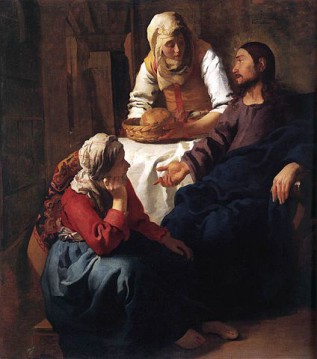
In Luke 10:38-42 we observe Jesus interacting with his dear friends, Martha and Mary. Apparently these sisters had Jesus over for a meal, and for friendly sharing. This story comes immediately after the Parable of the Good Samaritan in the sequence of Luke's gospel, and is followed by a scene in which Jesus teaches his followers to pray, and encourages them to persevere in prayer.
Much has been made of this reading over the years. If one were to do a historical review of commentaries on this reading, one would find a wide variety of interpretations that often contradict one another. Some have viewed this reading as a criticism of traditional female roles (meal preparation in the kitchen) as compared to more traditional male roles (education, learning at the “feet of the master”). Others have interpreted the reading as an affirmation of feminine passivity and dependency, as opposed to more active instrumental behaviors. Still others have interpreted this reading in primarily spiritual terms, as Jesus' affirming a contemplative approach to life over an active one.
Recalling that this story occurs in the context of scenes and stories about the nature of discipleship, perhaps we can look at this reading from this perspective. Perhaps we can understand it in simple human terms. We see three friends getting together for a meal. One, Martha, is “burdened with much serving.” Jesus compassionately responds to her: “Martha, Martha, you are anxious and worried about many things.” He acknowledges her stress. He does not criticize her. He does not reprimand her. Yet, he seems to be suggesting that less preparations, and less stress, would be better for her. He is inviting her to simplify her activities, so that she might have time to relax. Jesus is not advocating that Martha neglect her responsibilities. Some activity is necessary; after all, what would a dinner party be without a dinner? But, perhaps she can simplify what she is doing.
An important part of discipleship is balance. We are being invited to maintain balance in our lives — our family relationships, our social lives, our work lives, and our ministry/service activities. We can easily get out of balance, by taking on too much, becoming over extended, making life too complicated. We can miss the mark, preparing elaborate meals when simple ones will do, and then not having the time or energy to enjoy the presence of those we are with.
So, lets relax. Let's consider where can we simplify our lives and still meet our primary obligations. Let's think about where can we do less and still fulfill our commitments. Where can we find greater balance in our lives? Where can we experience greater freedom from compulsive over activity, so that we might have more freedom, and time, for relaxation, companionship, intimacy, rest and peace?
As we continue to grow in our life of discipleship, may we worry and fret less, simplify our lives, and more easily enter into genuine encounters with those around us, and with our loving God.





